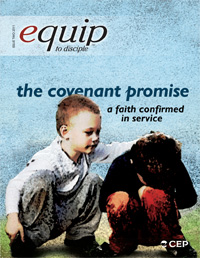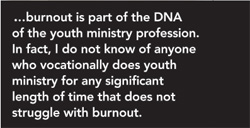 Editor’s Note: The following article was written by Bob Edmiston who has served CEP as Coordinator of Training and is presently a consultant. A major part of CEP’s ministry is oriented to the “rising generations.” With that word, we commend the following article to you.
Editor’s Note: The following article was written by Bob Edmiston who has served CEP as Coordinator of Training and is presently a consultant. A major part of CEP’s ministry is oriented to the “rising generations.” With that word, we commend the following article to you.
MINISTRY TO CHILDREN
Making disciples and assisting parents to disciple their children is the long term task of the church’s ministry. Discipleship is more than eliciting a profession of faith and teaching Bible stories; it is helping children understand what it means to love God, and to love others with the prayer that God will make Himself known to them and bring them to Himself. Also, it is attempting to model, by word and deed, that Christianity is a way of life built on the Word of God and a personal relationship with Christ.
PRESENTING CHRIST TO CHILDREN
Theological Considerations
When we present our children publicly to the church, we do so on the basis of God’s covenant promise-to be our God and the God of our children. But we also acknowledge our children’s need of the cleansing blood of Christ and the renewal of the Holy Spirit.
Parents and the church agree they will be actively involved in teaching and modeling the Gospel of the Kingdom before them. This reminds us of two things:
1. Our children are covenant children of God and 2. The need to be taught and urged to see their need to believe in Jesus and repent of their sins, in order for our beliefs to become their beliefs, growing out of our faith and trust in God. Our hope is they will follow in the faith which they own for themselves.
Along with those covenant promises upon which kingdom discipleship operates:
The Bible indicates that we are sinners for at least two reasons:
1. We sin. Though the word “sin” is seldom used outside the church, and our society finds it increasingly difficult to objectively identify certain behavior as wrong, the concept permeates the Bible. Today the issue is “what is right for you?” But there is a standard of right and wrong. It is defined and described in the Scriptures. The human race, individually and collectively, has not measured up. The good news is God has dealt with our failure. It is not necessary to hopelessly travel the road leading to destruction.
2. We come into this world with the need for a new nature. In Romans 5, Paul indicates sin entered the world through one man – Adam (v. 12). Death reigned because of his disobedience (v. 17). As a result of that one trespass our entire race is condemned (v. 18).
While original sin is part of Christian theology, this doctrine has been at odds with contemporary understandings of human nature for some time. The idea that children are born with an innate goodness or innocence persists.
How does God look at a child? Christians have responded in several ways:
1. Some suggest that God will withhold judgment until an “age of accountability” – that is, the point at which a person knows the difference between right and wrong. The difficulty is that this view has no biblical support.
2. Others believe that baptism washes away the stain of “original sin.” That posits a view of baptism which has been, and continues to be, held by large constituencies in the church.
For theo Roman Catholoc view of baptism, timing was a consideration and baptism was to be done as quickly as possible for the protection of the child.
The PCA’s Book of Church Order (BOCO)says, “Baptism is not to be unnecessarily delayed.” It does not support the idea that baptism cleanses from original sin. Rather it is a sign that the child is part of the Christian family.
3. A third group goes back to the covenant God has made with his people. This is the PCA’s position.
The words of Paul are comforting to Christians. If a believer is married to an unbeliever, the unbeliever is sanctified by the believer (1 Cor. 7:14). Strong language; yet the covering given by the believer is short of salvation. To become part of God’s family the unbeliever must turn in faith to Jesus. Paul continues, “Otherwise your children would be unclean, but as it is they are holy” (v. 14). This is particularly hopeful to those who have lost young children.
The children who are part of the Christian family are:
1. Those who have at least one believing parent. They are “non-communicant” members of the church. They are members on the basis of the promise of God, and parents who claim that promise by faith.
Some have suggested the regeneration of such children is a given. Consequently, they are assumed to be believers and are seldom, if ever, challenged to believe in Jesus. Congregations, even entire denominations, have suffered as a result. The most acute pain, however, has been felt by those parents whose children grew into adulthood without ever making a commitment to Christ.
Even when children are faithfully challenged to follow, there are those who refuse to believe. Some within the church say, or imply, that if parents and others do certain things there is a virtual guarantee that children will turn out “right.” But the Bible does not support that. The classic example: “Jacob I loved; Esau I hated” (Mal.1:2, 3; Rom.9: 11-13).
God has given the church promises. It is much more likely that a child of believing parents will follow Christ. But it is also clear that many of our covenant children have forsaken their heritage. The promise is not void; in fact many children will come back. Still, it is sobering to consider how many we are losing.
In baptism, children of believing parents formally become part of the church. When adults transfer membership, their baptized children are listed with them as “non-communicant” members (BOCO 12:5). However, those children must be continually challenged to claim the faith of their parents as their own, as expressed in the baptismal vows.
2. Those who have believed. Children are able to believe with whatever capabilities they have at any given age. Consequently, age characteristics should be considered when children are challenged to believe, not whether they should be challenged.
Some children express faith as preschoolers; however, it is imperative that their parents and the church continue to press the claims of Christ as they mature.
Believing children, whose parents have not come to faith, are also part of the church, even though there is no formal way to recognize that until such time as they are able to make a credible profession of faith. Most every church has children like this who are in Sunday school, Pioneer Clubs or VBS. They have responded in an age-appropriate way to the claims of Christ.
They are vivid illustrations of the way God constantly stretches the boundaries of his church. His grace is experienced not just in Christian homes but in the families of many who do not know him.
A high priority for the church should be incorporating such unbelieving parents into the Christian family.
Coming to faith in Christ can be:
1. A gradual experience. Faith is a process. The prevailing notion is that faith is an event. Many who point to an event however, do so because they are culturally conditioned, but in reality their faith grew over time and the event may or may not have had the significance they have attached to it. Some children seem to respond to Christ naturally from their earliest years. Such was the case with Samuel (I Samuel 1 & 2 especially, 1:23 – 28; 2:11). There are instances where regeneration occurred in the womb: John the Baptist (Luke l:15) and Jeremiah (Jeremiah l:5). Children raised in Christian homes hopefully will experience the nurture of parents and give evidence of saving faith.
2. An event – often a dramatic event. Many have professed faith in this way. But if the norm is the formulas present-day evangelicals use, there were centuries in the history of the church where almost no one came to faith.
The “sinner’s prayer” is often offered as the way to come to faith and has been the means by which large numbers of people have expressed belief in Christ. At the same time it can be an obstacle:
A. There are many who have prayed the prayer and believed that they have fulfilled all that is required to be “saved.” Sometimes it is necessary to explain why a person is not a Christian before it is possible to talk about how to come to faith. Large numbers of people have been lulled into a false sense of security, believing that they are right with God when, in fact, they are not. Children are particularly vulnerable to this distortion. They tend to be easily manipulated. It is possible to get them to raise their hands and repeat prayers asking Jesus to forgive them when they have no concept of what faith entails.
B. There are those who have prayed the prayer but nothing seemed to happen. There were no dramatic changes. The struggles remained. Consequently, doubts not only appeared, but were overwhelming. Some people have prayed the prayer again and again, each time hoping for light to dawn, feelings to change, and destructive behavior to suddenly become a thing of the past. After awhile they may wonder if it is possible for them to attain salvation.
Faith is not works, yet faith grows as it is expressed in the disciplines of faith. Through those disciplines commitment to Jesus is internalized.

 We have looked at all four learning styles. Did you find where you fit? Even more, have you learned to appreciate that not everyone learns in the same way you learn? This time I want to go a step further and explain how learning styles fit in different cultural settings, and next time how it even affects different denominations.
We have looked at all four learning styles. Did you find where you fit? Even more, have you learned to appreciate that not everyone learns in the same way you learn? This time I want to go a step further and explain how learning styles fit in different cultural settings, and next time how it even affects different denominations.
 I believe it was Benjamin Franklin who said “an ounce of prevention is worth a pound of cure.” That old axiom provides some guidance for the youth ministry burnout scenario that I have been describing. By taking preventative measures, I believe that in many instances burnout can be stopped before it grows roots and chokes out your ministry. Here are four “preventative measures” others in youth ministry have recommended to me over the years that I have used to stave off debilitating seasons of burnout.
I believe it was Benjamin Franklin who said “an ounce of prevention is worth a pound of cure.” That old axiom provides some guidance for the youth ministry burnout scenario that I have been describing. By taking preventative measures, I believe that in many instances burnout can be stopped before it grows roots and chokes out your ministry. Here are four “preventative measures” others in youth ministry have recommended to me over the years that I have used to stave off debilitating seasons of burnout.